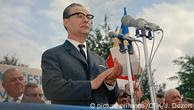(德國之聲中文網)1968年1月5日,亞歷山大‧杜布切克(Alexander Dubcek)當選捷克斯洛伐克共產黨中央第一書記。專制統治下的捷克斯洛伐克由此開啟了一場激烈的自由化進程。
盡管史稱"布拉格之春"的這場運動最終遭到蘇軍鎮壓,但對於當時被強制實行共產主義已經20年的捷克斯洛伐克來說,民眾還是感受到了對未來的希望。
馬塔‧庫比索瓦(Marta Kubisova)當時是捷克的著名流行歌手,也是布拉格之春的象徵性人物。她回憶當年時表示:"杜布切克當選之後,人們確實能感受到變革的氛圍。"
杜布切克的改革曾喚醒很多人的期望
"那是一段無法忘懷的、美好的時期。人們得以自由呼吸,並認為20年壓抑之後,這裡終於出現了積極的變化。"
人性化的社會主義
歷史學家彼得‧布拉察克(Petr Blazek)認為,杜布切克當選並不是發生布拉格之春的唯一原因。事實上,1956年,赫魯曉夫對其前任斯大林的譴責,就已經為日後的布拉格之春鋪平了道路。六十年代初,捷克斯洛伐克釋放了許多政治犯,1967年,一些作家聯合起來對當局表達不滿,而該國經濟的長期疲軟,使得人們對改革的期盼越來越強烈。
曾在蘇聯度過童年時代的杜布切克一上台,就同其前任強硬派領導人諾瓦德尼形成了鮮明的對比。布拉察克說:"杜布切克顯得很開明,總是以微笑的面容出現在公開場合。"
杜布切克上台的改革舉措立即引起了全世界的關註:他首次提出了"人性化的社會主義制度"這一概念。
同當年許多捷克斯洛伐克人一樣,歌星馬塔也曾是杜布切克的鐵桿粉絲。不過,她對杜布切克的宏偉目標能否順利實現,則並不樂觀。
蘇軍坦克的入侵激起了廣泛的民憤
馬塔說:"人性化的社會主義,這聽起來很不錯。不過,當時我已經和很多共產黨人打過交道,所以我根本就沒想太多。"
歷史學家亞當姆奇(Jan Adamec)則表示,"人性化社會主義"是政治營銷方面的一個絕好例證。這個概念很模糊,可以有各種各樣的解釋,既可以是"充滿人性的共產主義專政",也可以是"充滿社會主義色彩的自由民主制度"。
取消新聞審查
對於杜布切克是否是真心推動改革,抑或只是被改革大潮推上風口浪尖的政治人物,歷史學家對此莫衷一是。亞當姆齊表示:"他們只是想樹立一個比較進步的新領導層形象,但我認為,1968年所發生的那一切並不是他們所追求的。他們越是推動改革,就越是成為這場改革大戲的觀眾。"
杜布切克當時推行的最激進的改革步驟,就是取消了共產黨國家的一個重要統治基礎:新聞審查。而杜布切克1968年四月開啟的這一變革也為其日後下台埋下了伏筆。
亞當姆齊說:"當一個禁言的社會突然被賦予言論自由時,那取消禁令者本身當然也會成為批判的對象。有人批評杜布切克過於激進,有人則批評他不夠激進。"
布拉格當局從來沒有想過要放棄共產黨的領導地位。但是,隨著改革進程的推進,民眾要求變革的呼聲越來越高,這一點令莫斯科和布拉格的既得利益階層憂心忡忡。
1968年8月21日,蘇聯領導下的華約軍隊開進捷克斯洛伐克境內,布拉格之春遭到鎮壓。並由此開始了歷時20年的蘇聯佔領狀態。
捷克境內的蘇軍坦克
歷史學家布拉察克認為杜布切克是一個徹頭徹尾的失敗者,因為他讓當時的改革派和保守派都大失所望,同時又對蘇聯陣營的反應估計不足。他說:"他是一個不同尋常的人物,很受民眾歡迎,能贏得很多支持者。但我並不認為,他是20世紀捷克斯洛伐克一名偉大的政治家。"
歌星馬塔曾是「布拉格之春」的象徵性人物
蘇軍入侵後,杜布切克的日子就走到盡頭了。當時,歌星馬塔仍對杜布切克表示支持,並在艱苦的條件下錄制了一首"馬塔頌歌",她在這首歌裡歌頌和平,反對仇殺。這首感人的歌曲很快就成為布拉格之春的象徵。
沒過多久,這首歌就被電台禁止播出。而從1968年直到20年後的1989年,歌手馬塔也被禁止演出。
布拉格之春持續了大約六個月,隨之而來的是廣泛的失望情緒和大規模的移民潮。但是歌手馬塔認為,正是這短短六個月的自由,讓人們堅信共產黨統治終將會結束。她說:"布拉格之春給了我們力量,它給了我們呼吸自由空氣的機會,從而增強了我們對自由的渴望。這種渴望陪伴了我們隨後的20年。"
作者:Ian Willoughby (布拉格)
"那是一段無法忘懷的、美好的時期。人們得以自由呼吸,並認為20年壓抑之後,這裡終於出現了積極的變化。"
人性化的社會主義
歷史學家彼得‧布拉察克(Petr Blazek)認為,杜布切克當選並不是發生布拉格之春的唯一原因。事實上,1956年,赫魯曉夫對其前任斯大林的譴責,就已經為日後的布拉格之春鋪平了道路。六十年代初,捷克斯洛伐克釋放了許多政治犯,1967年,一些作家聯合起來對當局表達不滿,而該國經濟的長期疲軟,使得人們對改革的期盼越來越強烈。
曾在蘇聯度過童年時代的杜布切克一上台,就同其前任強硬派領導人諾瓦德尼形成了鮮明的對比。布拉察克說:"杜布切克顯得很開明,總是以微笑的面容出現在公開場合。"
杜布切克上台的改革舉措立即引起了全世界的關註:他首次提出了"人性化的社會主義制度"這一概念。
同當年許多捷克斯洛伐克人一樣,歌星馬塔也曾是杜布切克的鐵桿粉絲。不過,她對杜布切克的宏偉目標能否順利實現,則並不樂觀。
蘇軍坦克的入侵激起了廣泛的民憤
馬塔說:"人性化的社會主義,這聽起來很不錯。不過,當時我已經和很多共產黨人打過交道,所以我根本就沒想太多。"
歷史學家亞當姆奇(Jan Adamec)則表示,"人性化社會主義"是政治營銷方面的一個絕好例證。這個概念很模糊,可以有各種各樣的解釋,既可以是"充滿人性的共產主義專政",也可以是"充滿社會主義色彩的自由民主制度"。
取消新聞審查
對於杜布切克是否是真心推動改革,抑或只是被改革大潮推上風口浪尖的政治人物,歷史學家對此莫衷一是。亞當姆齊表示:"他們只是想樹立一個比較進步的新領導層形象,但我認為,1968年所發生的那一切並不是他們所追求的。他們越是推動改革,就越是成為這場改革大戲的觀眾。"
杜布切克當時推行的最激進的改革步驟,就是取消了共產黨國家的一個重要統治基礎:新聞審查。而杜布切克1968年四月開啟的這一變革也為其日後下台埋下了伏筆。
亞當姆齊說:"當一個禁言的社會突然被賦予言論自由時,那取消禁令者本身當然也會成為批判的對象。有人批評杜布切克過於激進,有人則批評他不夠激進。"
布拉格當局從來沒有想過要放棄共產黨的領導地位。但是,隨著改革進程的推進,民眾要求變革的呼聲越來越高,這一點令莫斯科和布拉格的既得利益階層憂心忡忡。
1968年8月21日,蘇聯領導下的華約軍隊開進捷克斯洛伐克境內,布拉格之春遭到鎮壓。並由此開始了歷時20年的蘇聯佔領狀態。
捷克境內的蘇軍坦克
歷史學家布拉察克認為杜布切克是一個徹頭徹尾的失敗者,因為他讓當時的改革派和保守派都大失所望,同時又對蘇聯陣營的反應估計不足。他說:"他是一個不同尋常的人物,很受民眾歡迎,能贏得很多支持者。但我並不認為,他是20世紀捷克斯洛伐克一名偉大的政治家。"
歌星馬塔曾是「布拉格之春」的象徵性人物
蘇軍入侵後,杜布切克的日子就走到盡頭了。當時,歌星馬塔仍對杜布切克表示支持,並在艱苦的條件下錄制了一首"馬塔頌歌",她在這首歌裡歌頌和平,反對仇殺。這首感人的歌曲很快就成為布拉格之春的象徵。
沒過多久,這首歌就被電台禁止播出。而從1968年直到20年後的1989年,歌手馬塔也被禁止演出。
布拉格之春持續了大約六個月,隨之而來的是廣泛的失望情緒和大規模的移民潮。但是歌手馬塔認為,正是這短短六個月的自由,讓人們堅信共產黨統治終將會結束。她說:"布拉格之春給了我們力量,它給了我們呼吸自由空氣的機會,從而增強了我們對自由的渴望。這種渴望陪伴了我們隨後的20年。"
作者:Ian Willoughby (布拉格)
|

留言
張貼留言